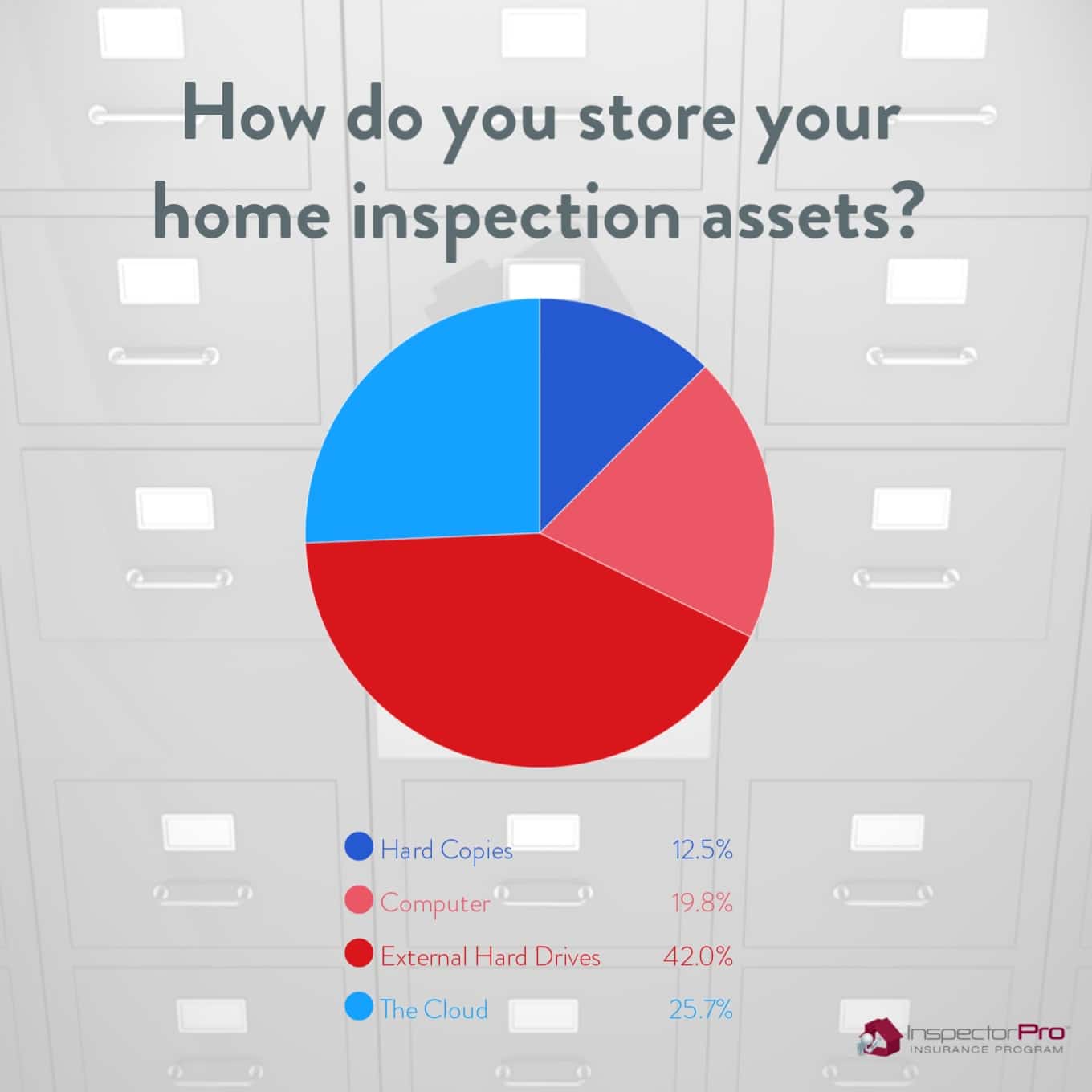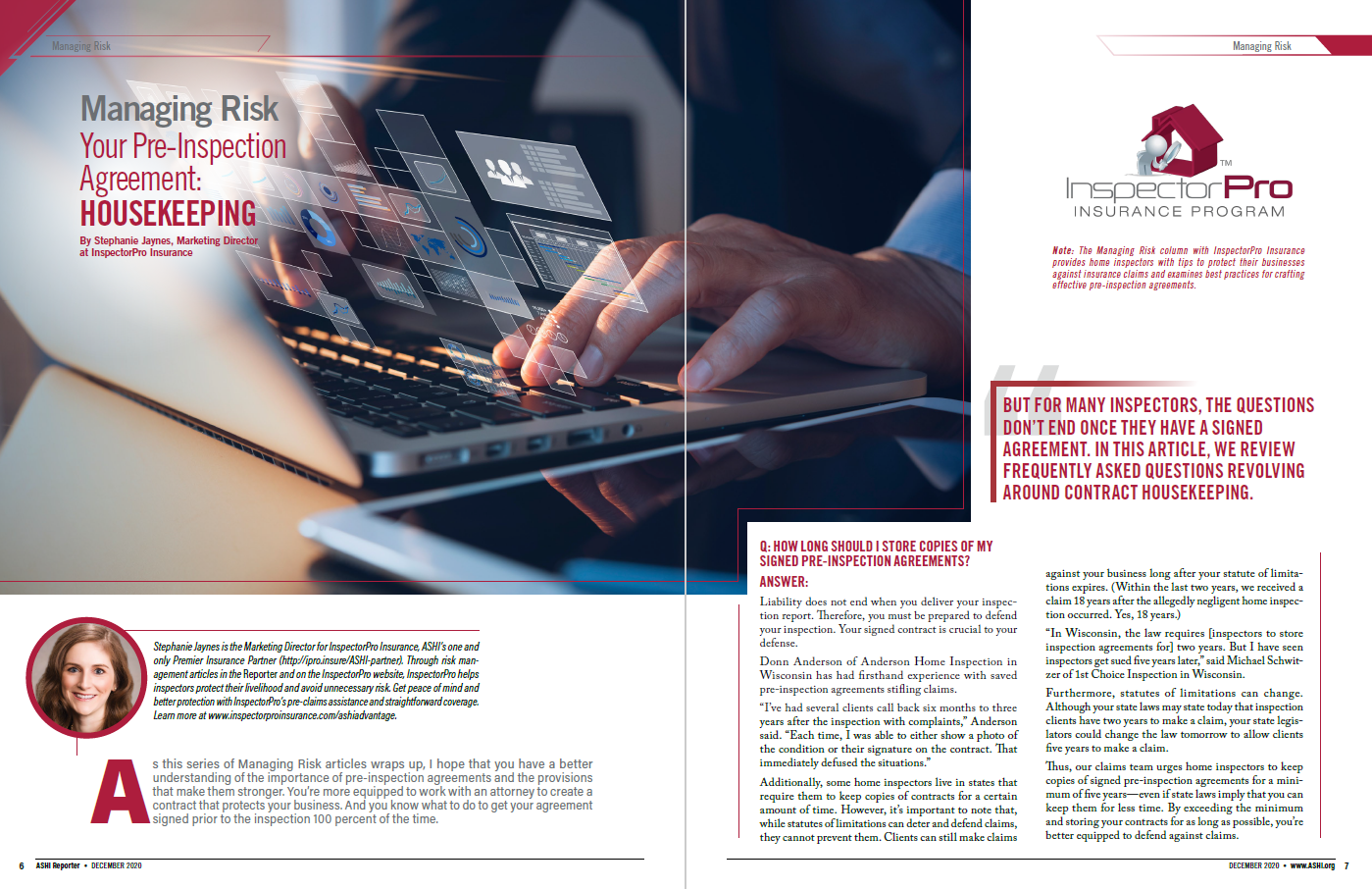Your Pre-Inspection Agreement: Housekeeping
Last Updated November 22, 2023

As this year and this series draws to a close, you have a better understanding of the importance of pre-inspection agreements and the provisions that make them stronger. You’re more equipped to work with an attorney to create a contract that protects your business. And you know what to do to get your agreement signed prior to the inspection 100 percent of the time.
But for many inspectors, the questions don’t end once they have a signed agreement. In this article, we go over some frequently asked questions revolving around contract housekeeping.
Q: How long should I store copies of my signed pre-inspection agreements?
 A: Liability does not end when you deliver your inspection report. Therefore, you must be prepared to defend your inspection. Your signed contract is crucial to your defense.
A: Liability does not end when you deliver your inspection report. Therefore, you must be prepared to defend your inspection. Your signed contract is crucial to your defense.
Donn Anderson of Anderson Home Inspection in Wisconsin has had firsthand experience with saved pre-inspection agreements stifling claims.
“I’ve had several clients call back 6 months to three years after the inspection with complaints,” Anderson said. “Each time, I was able to either show a photo of the condition or their signature on the contract. That immediately defused the situations.”
Additionally, some home inspectors live in states that require them to keep copies of contracts for a certain amount of time. However, it’s important to note that, while statutes of limitations can deter and defend claims, they cannot prevent them. Clients can still make claims against your business long after your statute of limitations expires. (Within the last two years, we received a claim 18 years after the allegedly negligent home inspection occurred. Yes, years.)
“In Wisconsin, the law requires [inspectors to store inspection agreements for] two years. But I have seen inspectors get sued five years later,” said Michael Schwitzer of 1st Choice Inspection in Wisconsin.
Furthermore, statutes of limitations can change. While your state may say that inspection clients have two years to make a claim today, your state could change the law to allow clients five years to make a claim tomorrow.
Thus, our claims team urges home inspectors to keep copies of signed pre-inspection agreements for minimum of five years—even if state laws imply that you can keep them for less time. However, by exceeding the minimum and storing your contracts for as long as possible, you’re better equipped to defend against claims.
Q: Is there a certain way I should be storing my signed contracts?
A: There are many ways to store your signed pre-inspection agreements. Here are some of the most popular:
- Hard Copies: If you store hard copies, you store your contracts printed and in binders or files. This method is easy to start and inexpensive, but it takes up a lot of space and is easy to lose.
- Computer Storage: You can save your signed inspection agreements straight on your desktop or laptop. This method is easy to start and inexpensive, too, and it’s easier to organize. However, you can run out of storage space quickly, and many agreements can slow down your computer.
- External Hard Drive: If you store your contracts on an external hard drive, you save your contracts digitally but separately from your computer. You get more storage capability, but it can be hard to organize—especially
 when you must buy multiple hard drives as they fill up. External hard drives are also more expensive than hard copies or computer storage, costing about $25 to $50 per hard drive.
when you must buy multiple hard drives as they fill up. External hard drives are also more expensive than hard copies or computer storage, costing about $25 to $50 per hard drive. - Cloud Storage: Due to its virtually unlimited storage space and reliability, cloud storage is our preferred solution. Cloud storage stores your pre-inspection agreements on a remote server you can access from the internet. Most cloud storage providers work on a subscription model, requiring payments monthly or annually. Prices depend on how much storage you purchase and how many people (users) are utilizing the service. Popular cloud storage solutions include Box, Dropbox, Google Drive, IDrive, Inspection Support Network (ISN), Microsoft OneDrive, and Nextcloud.
We asked home inspectors how they prefer to store inspection assets—including signed contracts. See what methods they like best in the graph below.

While the graph depicts preferences for some storage strategies over others, there is no mandatory method. In fact, many home inspectors store their inspection agreements across storage methods, and many industry experts suggest storing contracts with cloud storage or in multiple locations to prevent loss.
Q: How often should I revise my pre-inspection agreement?
 A: The home inspection industry is constantly changing and, likely, so is your business. From offering new services to changing your report writing, your company may be constantly evolving.
A: The home inspection industry is constantly changing and, likely, so is your business. From offering new services to changing your report writing, your company may be constantly evolving.
Laws change, too. Association or state requirements for home inspectors may update. Courts might change how they interpret certain laws. As such, it’s important to periodically review your contract to make sure it’s up to date.
Just a few years ago, a popular arbitration company went out of business. Many of our insureds were impacted because they referenced that arbitration company in their pre-inspection agreements. However, few of these inspectors knew that they were impacted because they weren’t reviewing their contracts.
In that instance, we alerted the inspectors who referenced the out-of-business arbitration company upon renewal that they needed to update their agreements. However, you cannot rely on your insurance provider, your franchise, or even your association to tell you when you need to update your agreement. Be sure to review your contracts annually with your attorney. And if things come up before your annual review that should impact your contract, feel free to update it earlier.
Q: When I do make changes to my contract, what’s my responsibility to the insurance company?
A: When you make changes to your pre-inspection agreement, you have a responsibility to send an updated copy to your insurance company. The reason: Your agreement is a part of your contract with your insurer. In fact, a copy of your pre-inspection agreement is attached to your insurance policy. As such, your insurer is responsible for indemnity and defense against covered claims arising from inspections before which you used the agreement they have on file. Failure to update your insurance company of changes to your agreement could result in a delay in claims handling.
Have multiple agreements? Make sure that your insurance company has a copy of each to attach to your policy.
Your pre-inspection agreement: your first line of defense.
Your pre-inspection agreement is a powerful risk management tool. Use it to the fullest by including important provisions, getting it signed before every inspection, storing them properly, and updating them regularly. Following each of these steps will better protect your business against claims.
This article was published in the ASHI Reporter in December 2020. See how this story appears in print below.



